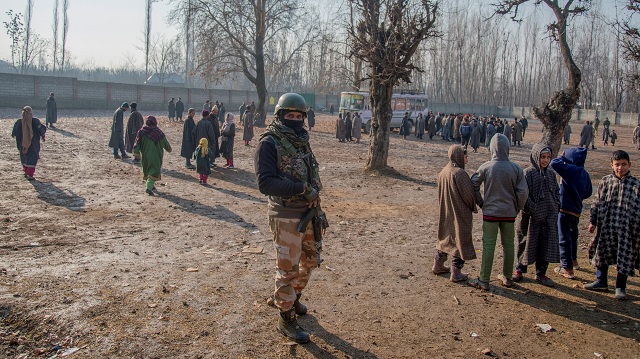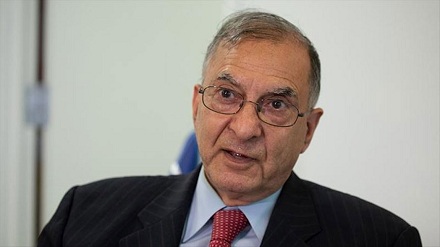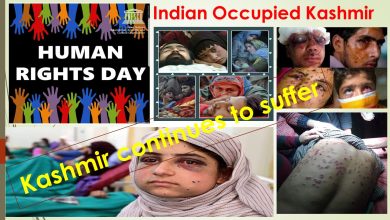 Displaying a calculated and considered callousness and insensitivity to the wishes and aspirations of the people of Indian occupied Kashmir, Amit Shah, the Home of Minister of India has announced that “Assembly poll will be held in Jammu and Kashmir before September 30, 2024.” He added that “BJP believes in winning hearts.”
Displaying a calculated and considered callousness and insensitivity to the wishes and aspirations of the people of Indian occupied Kashmir, Amit Shah, the Home of Minister of India has announced that “Assembly poll will be held in Jammu and Kashmir before September 30, 2024.” He added that “BJP believes in winning hearts.”

Election Commission of India has notified that Parliamentary election in Jammu will take place in two phases on April 26 and election in Srinagar constituency will take place on May 13 in four phases. Hirdesh Kumar, Chief Election Officer of Jammu & Kashmir said on August 17, 2022, that “We are expecting an addition of (2 to 2.5 million) new voters in the final list,” including non-Kashmiris living in the region.
Today, India confronts a Kashmir Rubicon in the disputed territory to elect members to the Indian Parliament. If India boldly crosses the Rubicon by conducting free, fair and transparent elections reflective of the genuine sentiments of the Kashmiri people, then a final peaceful settlement of the 77-year-old Kashmir conflict will be in sight. If India balks at a crossing and continues its old bad habit of election rigging and denying Kashmiri self-determination celebrated in United Nations Security Council resolutions, then Kashmir will remain beleaguered by repression, misery and destitution.
India always persisted in its colonial and antidemocratic ways in Kashmir. British historian, Bertrand Russell said in 1964, “The high idealism of the Indian government in international matters breaks down completely when confronted with the question of Kashmir.”
Jay Prakash Narayan who was known as ‘The Second Gandhi of India” confided to Indira Gandhi, then the Prime Minister of India in 1960: “We profess democracy but rule by force in Kashmir…[The Kashmir] problem exists not because Pakistan wants to grab Kashmir, but because there is deep and widespread political discontent among the people.”
George Fernandes, then the Federal Minister of Kashmir Affairs spoke at Harvard University, Center for International Affairs on October 12, 1990. “In so far as the immediate situation in Kashmir is concerned, I feel that we need to go back to 1984, when an elected government was dismissed by Delhi. The dismissal of the government sent signal to the people of Kashmir that any honest decision that they take in regard to the governance of the State could easily be set aside by the power that be in Delhi. Naturally, the anger against Delhi built up. In 1987, there could have been a fair election. Unfortunately, there was not. A lot of people were roughed up. A lot of young people were subjected to considerable humiliation. The Kashmiris felt that Delhi would prevent for all times any expression of people’s will in a fair and objective election. All this created among the youth a sense of total despondences and alienation.”
P. K. Dave, former Chief Secretary of the Jammu and Kashmir Government, confessed in 1991 that, “Elections in Kashmir have been rigged from the beginning.”
Arundhati Roy, Booker Prizewinner said on September 27, 2009, “Elections in Kashmir have had a long and fascinating past. The blatantly rigged state election of 1987 was the immediate provocation for the armed uprising that began in 1990. Since then, elections have become a finely honed instrument of the military occupation, a sinister playground for India’s deep state. It is Intelligence agencies more than anyone else who decide what the outcome of each election will be. After every election, the Indian establishment declares that India has won a popular mandate from the people of Kashmir.”
Dr. Shri Prakash in his book, ‘Twenty Tumultuous Years Insights into Indian Polity’ on page 568 writes, “The Kashmiri anger actually began with the mass rigging of elections in 1987..”
Amy Waldman wrote in the New York Times on August 24, 2002, that “Rigged elections in Kashmir in 1987 helped trigger the armed uprising that India estimates has taken more than 35,000 lives.”
We know it now that the fraudulent elections in 1987 extinguished the last flicker of hope among Kashmiris that India would bow to a free and fair plebiscite as ordained by the Security Council.
The cure for counterfeit elections in Kashmir, however, is not more of the same, but providing the genuine democratic article. Thus, the people of Kashmir are eager to participate in the referendum if it is conducted with the trapping of free and fair choice, monitored and supervised by a neutral agency like the United Nations.
The status of East Timor was resolved in 1999 by a free and fair vote of the East Timorese. The same, championed by the United States and the European Union happened in Kosovo, Montenegro and Southern Sudan. The solution of Kashmir’s indigenous upheaval is no different. The irresponsible coveting of dignity, liberty and pride that comes with self-determination knows no territorial or regional boundaries.
The Security Council has denounced the “subterfuge” of elections in a 1957 resolution # 122. It reminded the concerned governments and authorities “of the principle embodied in its resolution that the final disposition of the State of Jammu and Kashmir will be made in accordance with the will of the people expressed through the democratic method of a free and impartial plebiscite conducted under the auspices of the United Nations.”
The resolution further elaborated that “the convening of a Constituent Assembly…and any action that Assembly may have taken or might attempt to take to determine the future shape and affiliation [of Kashmir]” would be no surrogate for Kashmiri self-determination.
I propose the following steps to be taken to make a referendum happen in Kashmir.
First, the demilitarization of the State of Jammu & Kashmir on either side of the Cease-fire Line.
Second, an atmosphere of peace and security must be created.
Third, all draconian laws, including Domicile Law which is designed to change the demography of Kashmir must be annulled.
Fourth, all political prisoners, including Mohammad Yasin Malik, Shabir Ahmed Shah, Masarat Aalam Bhat, Aasia Andrabi, Khurram Parvaiz and others must be released immediately and unconditionally.
Fifth, the rights of peaceful association, assembly and demonstrations must be restored.
Sixth, Kashmiri political resistance leadership must be permitted to travel abroad without hindrance,
Seventh, any solution must satisfy democratic principles, the rule of law, and security for every inhabitant of Kashmir, irrespective of their religious affiliations.
Eighth, an international and neutral team must be deputed to conduct the referendum.
Kashmir’s suffering is a rebuke to the United Nations for its inaction. The situation is a call on the conscience of the members of the Security Council, particularly to the United States.
A sincere and serious effort towards a just settlement of the Kashmir dispute must squarely deal with the realities of the situation and fully respond to the people’s rights involved in it. Indeed, any process that ignores the wishes of the people of Kashmir and is designed to sidetrack the United Nations will not only prove to be an exercise in futility but can also cause incalculable human and political damage.
–Dr. Fai is also the Secretary General, World Kashmir Awareness Forum








